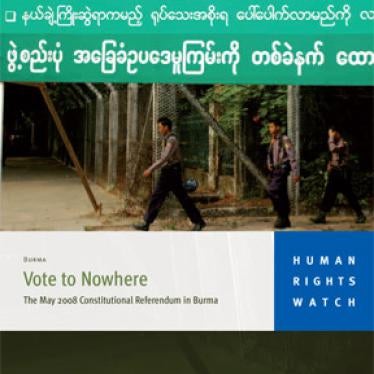"It is a duty of citizens to ratify the constitution -- Let's cast 'Yes' vote." So says a recently erected billboard in downtown Rangoon, Burma's largest city.
The Burmese are used to such billboards, scattered throughout the city advertising the military junta's view on all sorts of things from the upcoming constitutional referendum to the need to "crush all internal and external destructive elements as the common enemy." Tourists often take photographs of such billboards, finding the English translations of military propaganda downright bizarre. Yet for the Burmese, the billboards are more than an odd photo-opportunity. Instead, they represent the stark reality that surrounds them -- one of a military dominated society that controls everything and allows no dissent.
The military government's referendum on the draft constitution will take place as scheduled on May 10--- though the referendum will be delayed until May 24 in some parts of Burma, including Rangoon, after Cyclone Nargis swept through its Irrawaddy Delta. But nobody should confuse this event with a real referendum in which voters can freely express their opinions, or as progress towards democracy, as Burma's generals have claimed. Nothing about the process of drafting this constitution or the conditions under which the referendum is being held is remotely democratic—not least the fact that the purpose of the referendum is to ensure ongoing military rule.
The draft constitution was only released for sale to the public a month before the vote. It has not been translated into any of the 135 ethnic languages spoken by an estimated 40 percent of the population.
While the ruling State Peace Development Council permits billboards that encourage voters to say "yes," activists who criticize the referendum have been arrested and jailed. On March 30 and April 1, security forces detained seven members of the opposition National League for Democracy after they had participated in a peaceful march in downtown Rangoon wearing T-shirts emblazoned "No." Between April 25-29 the Thai-based Association for Assistance to Political Prisoners in Burma reported that over 70 Burmese activists have been arrested trying to stage demonstrations in Burma.
While government newspapers have hailed the provisions of the draft constitution, the few independent journalists writing for Burmese weekly newspapers and magazines have remained silent, preferring self-censorship to speaking out and thereby risking arrest.
The regime's vast network of informers and security forces generate fear not only among journalists and political opponents, but among average people. As an ethnic Karen school headmistress from the Irrawaddy Delta region explained to Human Rights Watch, "We're scared. If we don't support [the referendum] we will have to pay [a price], [be forced to] resign from work, no promotions, summoned by the police all the time. In our area no one has seen the new constitution... the authorities are very strict. If we don't attend a [pro-government] meeting, they know -- and there will be payback. We have no trust in the government."
People in Burma do not trust the government with good reason. All basic rights are curtailed. Violence and long prison terms are used to deal with peaceful dissent. The military has been in power since 1962 and has no plans to hand power to an elected civilian government. The draft constitution will simply entrench military rule, but with a civilian face. Under the proposed constitution, a quarter of all parliamentary seats are reserved for the military. Political parties are weakened by provisions that ban individuals and entire parties from eligibility for office. In a provision aimed at opposition leader and Nobel laureate Aung San Suu Kyi, it bars anyone with a foreign husband or child from running for president; Suu Kyi's late husband was British and she has two children with British nationality.
A credible referendum requires voters to have free access to information, a free media, and the ability to meet and organize to discuss the issues and - horror of horrors for the Burmese government -- to disagree. In Burma none of these exist. Burma's constitutional referendum vote is a fraud.
If there is to be genuine political change in Burma, then its major trade partners and supporters (particularly China, India and Thailand) and other concerned states should make it clear publicly that they will not recognize the referendum. … Instead, they should insist on a genuine process that all political parties and ethnic groups can freely participate in. For starters, the junta should release all political prisoners, including Aung San Suu Kyi. Only then may dialogue between the generals and Burma's opposition parties, including the many marginalized ethnic minority groups, lead to a transition to real democracy.
Elaine Pearson is the deputy director of the Asia division at Human Rights Watch
Human Rights Watch's report, Vote to Nowhere: The May 2008 Constitutional Referendum was released on May 1 and is available at https://www.hrw.org/reports/2008/burma0508/







